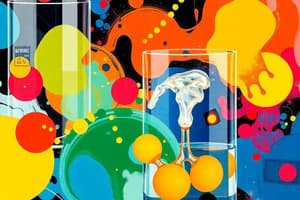Podcast
Questions and Answers
What is the main characteristic of a compound?
What is the main characteristic of a compound?
- It has a fixed chemical composition (correct)
- It has a variable composition
- It consists of different elements only
- It cannot be separated into simpler substances
Mixtures always have a fixed composition.
Mixtures always have a fixed composition.
False (B)
What method can be used to separate components of a mixture?
What method can be used to separate components of a mixture?
Physical means
In a compound, there are __________ between the atoms of different elements.
In a compound, there are __________ between the atoms of different elements.
Match the separation technique with its appropriate application:
Match the separation technique with its appropriate application:
Which of the following statements is true regarding mixtures?
Which of the following statements is true regarding mixtures?
Fractional distillation is used for separating liquids with significantly different boiling points.
Fractional distillation is used for separating liquids with significantly different boiling points.
The process of __________ is used to separate a liquid from a dissolved solid.
The process of __________ is used to separate a liquid from a dissolved solid.
What is the primary focus of the document?
What is the primary focus of the document?
A mixture can consist of elements and compounds.
A mixture can consist of elements and compounds.
What is the significance of separating mixtures in chemistry?
What is the significance of separating mixtures in chemistry?
A ____ is formed when two or more elements are chemically bonded.
A ____ is formed when two or more elements are chemically bonded.
Match the following categories with their definitions:
Match the following categories with their definitions:
Which method is commonly used for separating mixtures?
Which method is commonly used for separating mixtures?
A molecule can consist of more than one atom of the same element.
A molecule can consist of more than one atom of the same element.
Define a mixture.
Define a mixture.
Which method is commonly used to separate a solution by evaporating the solvent?
Which method is commonly used to separate a solution by evaporating the solvent?
A mixture can be separated into its components using only chemical reactions.
A mixture can be separated into its components using only chemical reactions.
What is the definition of a mixture?
What is the definition of a mixture?
The process of separating the components of a mixture by differences in boiling points is known as __________.
The process of separating the components of a mixture by differences in boiling points is known as __________.
Match the separation techniques with their descriptions:
Match the separation techniques with their descriptions:
Which of the following statements about mixtures is true?
Which of the following statements about mixtures is true?
All components in a mixture lose their properties after mixing.
All components in a mixture lose their properties after mixing.
Name one example of a separation technique that uses a barrier.
Name one example of a separation technique that uses a barrier.
A __________ is a pure substance made of two or more different types of atoms chemically bonded together.
A __________ is a pure substance made of two or more different types of atoms chemically bonded together.
What is the primary component that gets evaporated during distillation?
What is the primary component that gets evaporated during distillation?
Flashcards
Element
Element
A substance that cannot be broken down into simpler substances by chemical means.
Compound
Compound
A substance formed when two or more elements chemically combine in a fixed ratio.
Mixture
Mixture
A combination of two or more substances that are not chemically bonded and can be easily separated.
Distillation
Distillation
Signup and view all the flashcards
Filtration
Filtration
Signup and view all the flashcards
Sedimentation
Sedimentation
Signup and view all the flashcards
Fractional distillation
Fractional distillation
Signup and view all the flashcards
Solution
Solution
Signup and view all the flashcards
Suspension
Suspension
Signup and view all the flashcards
Evaporation
Evaporation
Signup and view all the flashcards
Simple Distillation
Simple Distillation
Signup and view all the flashcards
Condensation
Condensation
Signup and view all the flashcards
Boiling Point
Boiling Point
Signup and view all the flashcards
Sieving
Sieving
Signup and view all the flashcards
What is an element?
What is an element?
Signup and view all the flashcards
What is a compound?
What is a compound?
Signup and view all the flashcards
What is a mixture?
What is a mixture?
Signup and view all the flashcards
How does distillation work?
How does distillation work?
Signup and view all the flashcards
How does filtration work?
How does filtration work?
Signup and view all the flashcards
What is sedimentation?
What is sedimentation?
Signup and view all the flashcards
What is fractional distillation?
What is fractional distillation?
Signup and view all the flashcards
What is a solution?
What is a solution?
Signup and view all the flashcards
Study Notes
Separating Mixtures
- Mixtures are combinations of two or more substances that are physically combined, not chemically bonded.
- Mixtures can be separated using various physical methods.
- Examples of mixtures include air, saltwater, and soil.
Methods of Separation
- Evaporation: Separates a dissolved solid from a liquid. Heat the liquid until it evaporates, leaving the solid behind.
- Filtration: Separates solids from liquids or gases based on particle size.
- Distillation: Separates liquids with different boiling points by heating the mixture and condensing the vapor.
- Simple Distillation: Separates liquids with significantly different boiling points.
- Fractional Distillation: Separates liquids with closer boiling points.
- Magnetism: Separates magnetic solids from non-magnetic materials.
- Density: Separates substances with different densities by floating or sinking them in a liquid.
Chemical Reactions in Separation
- Chemical Reaction: A process where one or more substances (reactants) are converted into one or more different substances (products).
- Chemical reactions involve the breaking and forming of bonds between atoms.
- Example: 2Na + 2H₂O → 2NaOH + H₂ (Sodium reacts with water to produce sodium hydroxide and hydrogen gas).
Elements, Compounds, and Mixtures
- Element: A pure substance made up of only one type of atom.
- Compound: A substance formed when two or more different elements combine chemically.
- Examples of elements include hydrogen, oxygen, and iron.
- Examples of compounds include water (H₂O), sodium chloride (NaCl), and carbon dioxide (CO₂).
Electron Configuration
- Atoms have electron shells.
- Atoms strive to have a full outer shell (usually 8 electrons, except for hydrogen and helium which have 2) to achieve stability.
Studying That Suits You
Use AI to generate personalized quizzes and flashcards to suit your learning preferences.




